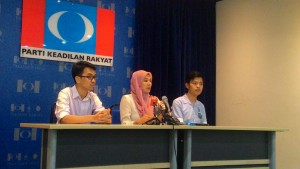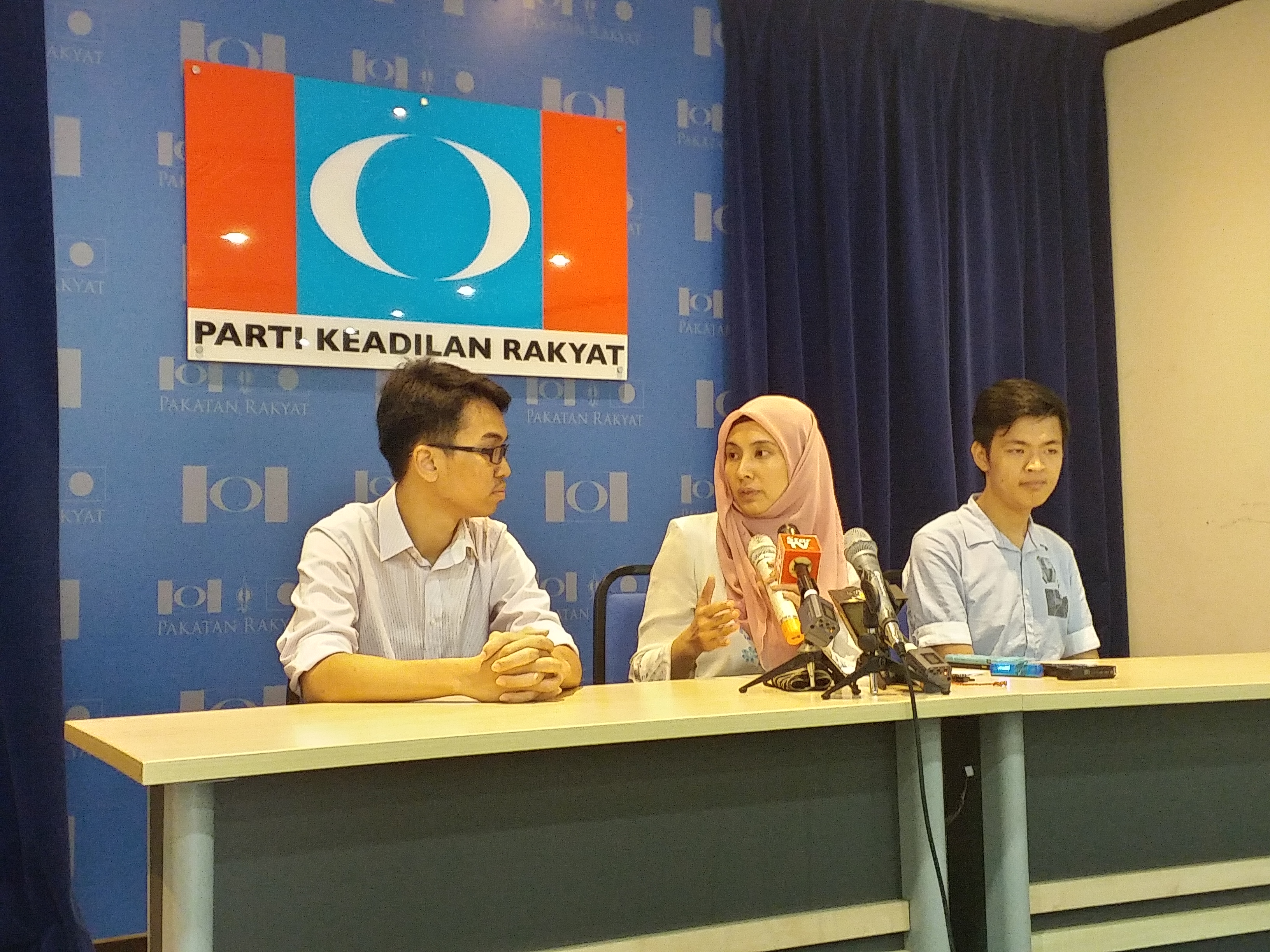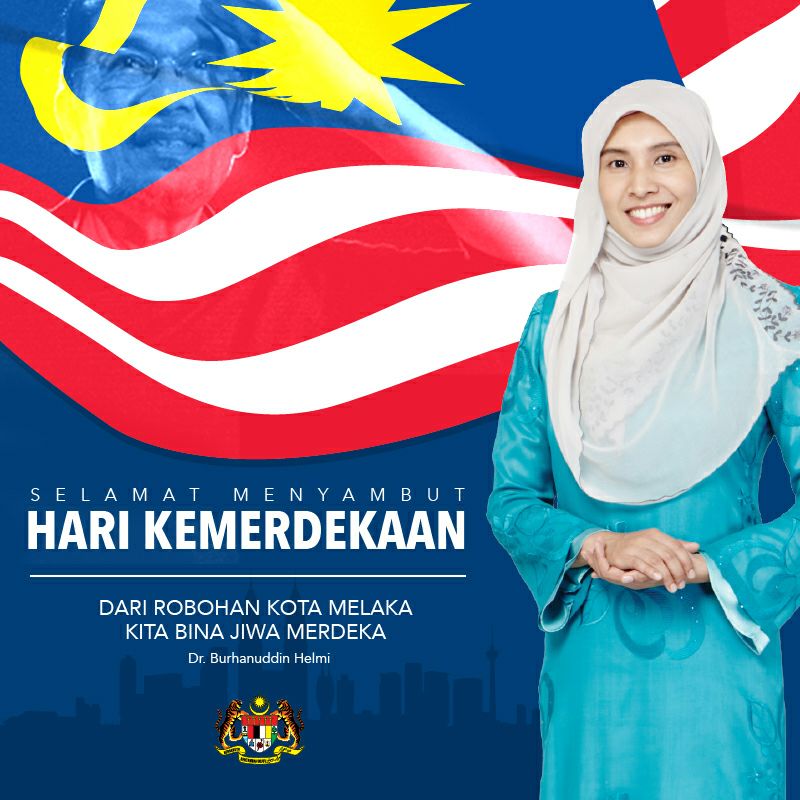 It is a shame that the ongoing history of disappointment from this government’s broken promises to the citizens of Malaysia also extends to the promise and subsequent withdrawal of international scholarships for our nation’s best and brightest students. I call on Prime Minister Dato’ Seri Najib Razak and the Minister of Education to reach out to the private sector, to rectify the situation for at least the present batch of students, and to ensure government spending on ego projects and losses from corruption are stemmed in future budgets sufficiently to provide for proper scholarship funding in the future.
It is a shame that the ongoing history of disappointment from this government’s broken promises to the citizens of Malaysia also extends to the promise and subsequent withdrawal of international scholarships for our nation’s best and brightest students. I call on Prime Minister Dato’ Seri Najib Razak and the Minister of Education to reach out to the private sector, to rectify the situation for at least the present batch of students, and to ensure government spending on ego projects and losses from corruption are stemmed in future budgets sufficiently to provide for proper scholarship funding in the future.
The resilience of the JPA scholars in pursuing their education overseas and in return, to contribute towards the development of Malaysia, have led them to approach the following government representatives:
- MCA Youth Chief, YB Senator Tuan Chong Sin Woon
- Dato’ Wong Nai Chee, political secretary to Prime Minister Najib Razak
- Dato’ Sri Liow Tiong Lai, MCA President
- Datin Dr Roslina Ahmad Mokhtar, the Director of PSD Human Capital Development and Puan Siti Zaharah binti Omar under the arrangement of Dato’ Wee Ka Siong
In fact, JPA scholars have also met with Prime Minister Najib Razak on 2 June 2016, where he stated that he would resume the scholarship program when convinced to do so.
Providing an alternative solution, these scholars are petitioning for the Renowned University Programme (Program Universiti Terkemuka / Program Liga Ivy dan Setara )[1] to be resumed. The scholarship has been in place since 2008, sponsoring students to exclusively the ten best universities in their respective fields of study according to the Times Higher Education World Ranking. However, every year since 2012, the fate of future students depend on government’s approval.
Citing a possible compromise between both governments and scholarship recipients, the students mooted the counter offer for the Prime Minister to reopen the Renowned University Programme. The implementation of this programme will allow some students to still pursue their tertiary education overseas.
Early this year, 744 JPA scholars were told out of the blue that they were not allowed to further their studies abroad.[2] The government cited financial difficulties for the slash in budget spending for scholarships. The cuts will save the government RM240 million in expenditure.[3]
Consequently, the government has reallocated these high caliber students from overseas universities to local ones – a move they claim will boost the quality of our local institutions.
However, these justifications do not cohere with the government’s actual actions.
This year, the budget of our higher education institutions suffers a steep 18 per cent cut, as the spending allocation decreases from RM15.78 billion in 2015 to RM13.37 billion.[4] In fact, our oldest and most esteemed local institution – Universiti Malaya, is forced to endure the most severe budget cut among all public universities of 27.30 percent.[5] It is unfair to tell our students that their presence will boost our local varsities, when a corresponding investment to better the quality of these institutions is absent.
While we acknowledge the possible merits of having our students study locally, the opportunities to study in a foreign countries should not be forsaken in its entirety. A study by the College Student Journal has demonstrated that the experience of studying abroad will improve a student’s cross-cultural skills and global understanding.[6] By investing some of our best talents overseas, we are simultaneously grooming a more diverse workforce that is better prepared for the effects of globalisation at the workplace. In their work, they are more adaptable to the differing demands and priorities of international businesses and governments, and more flexible in accommodating complex political, social and economic forces worldwide.
Besides, having opportunities to study overseas is still important because our tertiary education system lags behind that of many countries. According to the Times Higher Education World University Rankings 2015-2016, not a single Malaysian university is included in the top 200. Undeniably, certain universities have improved as Times Higher Education awarded Universiti Teknologi Malaysia (UTM) the 70th position among the top 200 universities in Malaysia. However, we are far from having a competitive education system. Worldwide, our best university, UTM was ranked below the 400th placing.[7][8] Our universities should do more to facilitate creativity and innovation for our graduates to compete in the global economy. This is the crux of Dato’ Seri Anwar Ibrahim’s directive when he took the helm as Deputy Prime Minister and the Finance Minister in the 1990s, reiterating the same concern again in 2008 when he protested the amendments to the University and University Colleges Act 1971 in Parliament.[9]
In their beliefs that education is the catalyst for socio-economic growth, two of our nation’s largest enterprises – Tenaga Nasional and Petronas – established Universiti Tenaga Nasional (UNITEN) and Universiti Teknologi Petronas (UTP).
If we had the political will to involve even the private sector investing towards education 20 years ago, I see no reason why we are not doing more today. It is a telling indictment of this government if it does not muster the resources necessary to fulfill its promise to our young scholars today.
Following the engagements with government representatives up to the Prime Minister, I urge the following:
- Prime Minister Najib to take our scholars’ proposal to reconsider the cancellation of 744 JPA overseas scholarships; including through the recommencement of the Renowned University Programme. I must commend Prime Minister Najib for his willingness to engage with our scholars first-hand. Now we await for the Prime Minister’s promise to be fulfilled.
- The private sector to reinvigorate its previous efforts by providing opportunities of sponsorship for these students – an investment in the education of our youth, our future thinkers.
Nurul Izzah Anwar
Member of Parliament, Lembah Pantai
Vice President & Election Director, People’s Justice Party (KEADILAN)
This statement is supported by the 2013 JPA scholars, who have received offers from top universities overseas, and the following 60 names of aspirants are not exhaustive.
- Ahmad Faiz bin Noordin
- Ang Khai Yee
- Beh Yuan Fei
- Benedict Low Hao Yi
- Chan Swee Lynn
- Chan Yee Choong
- Cheang Hoi Lim
- Cheow Kam Wai
- Chew Teng Teng
- Chin Kwok Yee
- Chong Kelly
- Chooi Je Ern
- Dhivyaa a/p N.Mailvaganam
- Divyaasiny a/p R. Rajaghantham
- Emily Kerk Wei Li
- Evon Chai Huey San
- Goo Yi Qun
- Hian Wen Xuan
- Hon Hui Lee
- Joanne Tan
- Jonathan Lee Heng Yow
- Kaautam Uthaya Suriyan
- Kasthuri Nallathamby
- Kishorie Maheswaren
- Lem Siew Yuen
- Lim Jie Hui
- Lim Yi Heng
- Lim Yu Min
- Lin Zi Khang
- Low Chuen Xian
- Marvin Yee Suet Yeng
- Ng Lu Yi
- Ong Siu Ching
- Ong Soon Keat
- Ooi Chiou Jia
- Ooi Xiandi
- P’ng Yi Ting
- Puvurn Raj a/l Thamil Selvan
- Raajeswari Ravindran
- Say Kah Mun
- See Lee Xin
- Shaarni Chandran
- Shazaain binti Abu Mansor
- Sia Chee Ying
- Tan Aik Ho
- Tan Chien Yuinn
- Tan Hooi Wang
- Tan Jia Hui
- Tan Lian May
- Tan Xue Heng
- Tee Chin Zhe
- Tee Ke Hui
- Teh Jye Quan
- Teng Kok Yong
- Ung Lik Teng
- Yau Suet Theng
- Yee Chin Mun
- Yee Jia Le, Cheryl
- Yeoh Ji Qing
- Yong Yu Jing
[1]http://webcache.googleusercontent.com/searchq=cache:vPa9oxa7MYoJ:www.jpa.gov.my/index.php%3Foption%3Dcom_content%26view%3Darticle%26id%3D2619:program-universiti-terkemuka%26catid%3D517:a-tajaan-dan-pinjaman%26Itemid%3D835%26lang%3Den+&cd=2&hl=en&ct=clnk
[2] https://www.malaysiakini.com/news/334448
[3] https://www.malaysiakini.com/news/334448
[4]https://asiancorrespondent.com/2016/02/how-are-budget-cuts-affecting-malaysian-public-universities/
[5]https://asiancorrespondent.com/2016/02/how-are-budget-cuts-affecting-malaysian-public-universities/
[6]http://search.proquest.com/openview/2545aa6fcc19ccd5289a60c79ec596b5/1?pq-origsite=gscholar
[7]https://www.timeshighereducation.com/world-university-rankings/2016/world-ranking#!/page/0/length/25/country/23/sort_by/rank_label/sort_order/asc/cols/rank_only
[8]http://www.nst.com.my/news/2016/06/153408/utm-makes-top-70-asian-university-rankings
[9]http://anwaribrahimblog.com/2008/12/14/nota-ucapan-dsai-perbahasan-rang-undang-undang-auku/
—————————————————————————————————
PERTEMUAN BERSAMA DATO’ SRI NAJIB RAZAK – BILAKAH PERDANA MENTERI AKAN MEMENUHI HASRAT 744 PELAJAR BIASISWA JPA?
Penarikan balik biasiswa JPA buat pelajar cemerlang negara merupakan satu kekecewaan berterusan terhadap kerajaan yang telah menabur pelbagai janji kepada rakyat. Saya menyeru kepada Perdana Menteri, Dato’ Sri Najib Razak dan Menteri Pengajian Tinggi untuk menyelesaikan dilema pelajar cemerlang yang terkandas menerusi pembaziran projek mega dan kerugian akibat amalan rasuah dapat diatasi supaya belanjawan mendatang mampu memperuntukkan biaya setimpal demi pendidikan bangsa.
Atas daya usaha pelajar biasiswa JPA untuk melanjutkan pelajaran ke luar negara dengan impian untuk menyumbang ke arah pembangunan Malaysia, telah membawa mereka untuk bertemu dan berunding dengan wakil kerajaan bagi mencari jalan penyelesaian, seperti:
- Ketua Pemuda MCA, YB Senator Tuan Chong Sin Woon
- Dato’ Wong Nai Chee, Setiausaha Politik kepada Dato’ Seri Najib Razak
- Dato’ Sri Liow Tiong Lai, Presiden MCA
- Datin Dr Roslina Ahmad Mokhtar, Pengarah Bahagian Modal Insan JPA dan Puan Siti Zaharah binti Omar dengan bantuan daripada Dato’ Wee Ka Siong
Malah, pelajar biasiswa JPA telah bertemu dengan Perdana Menteri Najib pada 2 Jun 2016, di mana beliau menyatakan hasrat untuk meneruskan program biasiswa selagi beliau diyakini. Saya pasti Dato’ Sri Najib Razak seperti kita semua juga mendokong pelaburan dalam bidang pendidikan buat generasi mendatang.
Sebenarnya, pelajar biasiswa JPA telah menganjur cadangan alternatif menerusi penyambungan semula Program Universiti Terkemuka atau Program Liga Ivy dan Setara.[1] Biasiswa ini telah dilaksanakan sejak 2008 dan menaja pelajar secara eksklusif di universiti sepuluh terbaik dunia dalam bidang pengajian masing-masing mengikut Times Higher Education World Ranking. Pun begitu, sejak 2012, nasib mereka bergantung kepada pertimbangan dan kelulusan kerajaan.
Sekiranya terdapat kerjasama dan persefahaman antara kedua-dua belah pihak, iaitu kerajaan dan penerima biasiswa, pelajar biasiswa JPA mencadangkan agar Perdana Menteri membuka semula program Renowned University. Pelaksanaan program ini memastikan pelajar dapat melanjutkan pengajian tinggi di luar negara.
Awal tahun ini, di saat akhir, seramai 744 pelajar biasiswa JPA diberitahu bahawa mereka tidak dibenarkan untuk melanjutkan pelajaran di luar negara[2]. Kerajaan menyatakan bahawa masalah kewangan menyebabkan pemotongan peruntukan untuk biasiswa. Potongan ini juga akan menjimatkan kos perbelanjaan kerajaan sebanyak RM240 juta[3].
Justeru , kerajaan telah menempatkan semula pelajar-pelajar yang berkaliber dari universiti luar negara ke universiti tempatan -satu langkah yang mereka dakwa akan meningkatkan kualiti institusi tempatan.
Walau bagaimanapun, justifikasi ini tidak selari dengan tindakan sebenar kerajaan.
Pada tahun ini, belanjawan untuk institusi pendidikan tinggi dipotong sebanyak 18 peratus, daripada peruntukan sejumlah RM 15.78 billion pada tahun 2015 kepada RM 13.37 billion pada tahun 2016[4].
Malah, institusi tempatan yang tertua dan paling dihormati, Universiti Malaya, mengalami pemotongan peruntukan tertinggi daripada universiti awam yang lain, iaitu sebanyak 27.30 peratus[5].
Tidak adil sekiranya pelajar diberitahu bahawa kehadiran mereka boleh meningkatkan kualiti universiti tempatan apabila pelaburan yang sama untuk memperbaiki kualiti institusi ini tidak dilaksanakan oleh kerajaan.
Walaupun kita mengakui terdapat kelebihan pelajar melanjutkan pengajian di universiti tempatan, namun peluang untuk belajar di peringkat antarabangsa tidak boleh dilupakan dengan sewenang-wenangnya. Kajian daripada College Student Journal membuktikan pengalaman melanjutkan pelajaran di luar negara dapat meningkatkan kemahiran pelajar dalam rentas budaya dan pemikiran global[6].
Dengan menghantar pelajar terbaik ke luar negara, kita mampu mempertingkatkan tenaga kerja yang lebih pelbagai dan bersedia menghadapi kesan globalisasi di tempat kerja. Mereka lebih menyesuaikan diri dengan tuntutan yang berbeza dan keutamaan dalam perniagaan antarabangsa dan kerajaan serta lebih fleksibel dalam menampung kuasa politik, sosial dan ekonomi yang kompleks di seluruh dunia.
Tambahan pula, peluang untuk melanjutkan pelajaran masih penting kerana sistem pendidikan kita yang jauh ketinggalan di belakang beberapa negara. Universiti kita perlu melakukan perubahan dari sudut kreativiti dan inovasi bagi membolehkan graduan kita bersaing dalam ekonomi global[7].
Ini adalah intipati perjuangan Datuk Seri Anwar Ibrahim semasa beliau mengambil tampuk pentadbiran negara sebagai Timbalan Perdana Menteri dan Menteri Kewangan pada tahun 1990-an , dan terus mengulangi kebimbangan yang sama sekali lagi pada tahun 2008 apabila beliau membantah pindaan kepada Akta Universiti dan Kolej Universiti 1971 di Parlimen[8]. Menurut Times Higher Education World University Rankings 2015-2016, tidak terdapat sebuah universiti di Malaysia tergolong dalam bahagian 200 teratas. Tidak dinafikan , terdapat universiti tertentu mengalami kemajuan yang positif dengan menyaksikan Times Higher Education menganugerahkan Universiti Teknologi Malaysia (UTM) di kedudukan ke-70 di kalangan 200 universiti di Malaysia.[9]
Berdasarkan keyakinan bahawa pendidikan merupakan pemangkin kepada perkembangan sosio-ekonomi negara, dua buah syarikat terbesar negara berjaya menubuhkan Universiti Tenaga Nasional (UNITEN) dan Universiti Teknologi Petronas (UTP).
Jika kita mempunyai kemahuan politik untuk melibatkan juga sektor swasta melabur ke arah pendidikan 20 tahun yang lalu, saya melihat tidak ada sebab mengapa kita tidak melakukan lebih hari ini.
Berikut merupakan gesaan saya kepada Perdana Menteri:
- Menerima cadangan daripada pelajar biasiswa untuk menimbang semula pembatalan 744 JPA biasiswa luar negara; termasuk mengembalikan semula Program Universiti Terkenal (Renowned University Programme). Saya memuji Perdana Menteri Najib kerana kesediaannya untuk melibatkan diri dengan pertemuan pertama bersama pelajar biasiswa. Kini, kita menunggu Perdana Menteri memenuhi janjinya.
- Melibatkan sektor swasta serta GLC untuk melabur dalam bidang pendidikan menerusi penajaan pelajar-pelajar JPA yang terkandas daripada belajar di luar negara. Pelaburan pendidikan untuk generasi muda, bakal menyumbang kepada negara.
Nurul Izzah Anwar
Ahli Parlimen Lembah Pantai
Naib Presiden & Pengarah Pilihanraya, Parti Keadilan Rakyat (KEADILAN)
Kenyataan ini disokong oleh pelajar biasiswa JPA tahun 2013 yang berjaya mendapat tawaran daripada universiti terbaik luar negara.
- Ahmad Faiz bin Noordin
- Ang Khai Yee
- Beh Yuan Fei
- Benedict Low Hao Yi
- Chan Swee Lynn
- Chan Yee Choong
- Cheang Hoi Lim
- Cheow Kam Wai
- Chew Teng Teng
- Chin Kwok Yee
- Chong Kelly
- Chooi Je Ern
- Dhivyaa a/p N.Mailvaganam
- Divyaasiny a/p R. Rajaghantham
- Emily Kerk Wei Li
- Evon Chai Huey San
- Goo Yi Qun
- Hian Wen Xuan
- Hon Hui Lee
- Joanne Tan
- Jonathan Lee Heng Yow
- Kaautam Uthaya Suriyan
- Kasthuri Nallathamby
- Kishorie Maheswaren
- Lem Siew Yuen
- Lim Jie Hui
- Lim Yi Heng
- Lim Yu Min
- Lin Zi Khang
- Low Chuen Xian
- Marvin Yee Suet Yeng
- Ng Lu Yi
- Ong Siu Ching
- Ong Soon Keat
- Ooi Chiou Jia
- Ooi Xiandi
- P’ng Yi Ting
- Puvurn Raj a/l Thamil Selvan
- Raajeswari Ravindran
- Say Kah Mun
- See Lee Xin
- Shaarni Chandran
- Shazaain binti Abu Mansor
- Sia Chee Ying
- Tan Aik Ho
- Tan Chien Yuinn
- Tan Hooi Wang
- Tan Jia Hui
- Tan Lian May
- Tan Xue Heng
- Tee Chin Zhe
- Tee Ke Hui
- Teh Jye Quan
- Teng Kok Yong
- Ung Lik Teng
- Yau Suet Theng
- Yee Chin Mun
- Yee Jia Le, Cheryl
- Yeoh Ji Qing
- Yong Yu Jing
[1] http://webcache.googleusercontent.com/searchq=cache:vPa9oxa7MYoJ:www.jpa.gov.my/index.php%3Foption%3Dcom_content%26view%3Darticle%26id%3D2619:program-universiti-terkemuka%26catid%3D517:a-tajaan-dan-pinjaman%26Itemid%3D835%26lang%3Den+&cd=2&hl=en&ct=clnk
[2] https://www.malaysiakini.com/news/334448
[3] https://www.malaysiakini.com/news/334448
[4]https://asiancorrespondent.com/2016/02/how-are-budget-cuts-affecting-malaysian-public-universities/
[5]https://asiancorrespondent.com/2016/02/how-are-budget-cuts-affecting-malaysian-public-universities/
[6]http://search.proquest.com/openview/2545aa6fcc19ccd5289a60c79ec596b5/1?pq-origsite=gscholar
[7]http://www.nst.com.my/news/2016/06/153408/utm-makes-top-70-asian-university-rankings
[8]http://anwaribrahimblog.com/2008/12/14/nota-ucapan-dsai-perbahasan-rang-undang-undang-auku/
[9]https://www.timeshighereducation.com/world-university-rankings/2016/world-ranking#!/page/0/length/25/country/23/sort_by/rank_label/sort_order/asc/cols/rank_only




